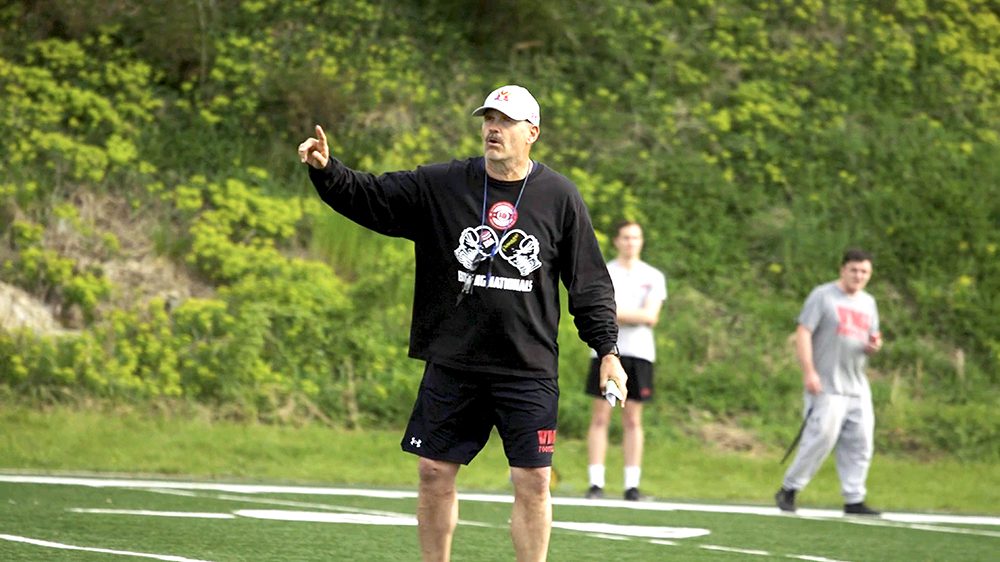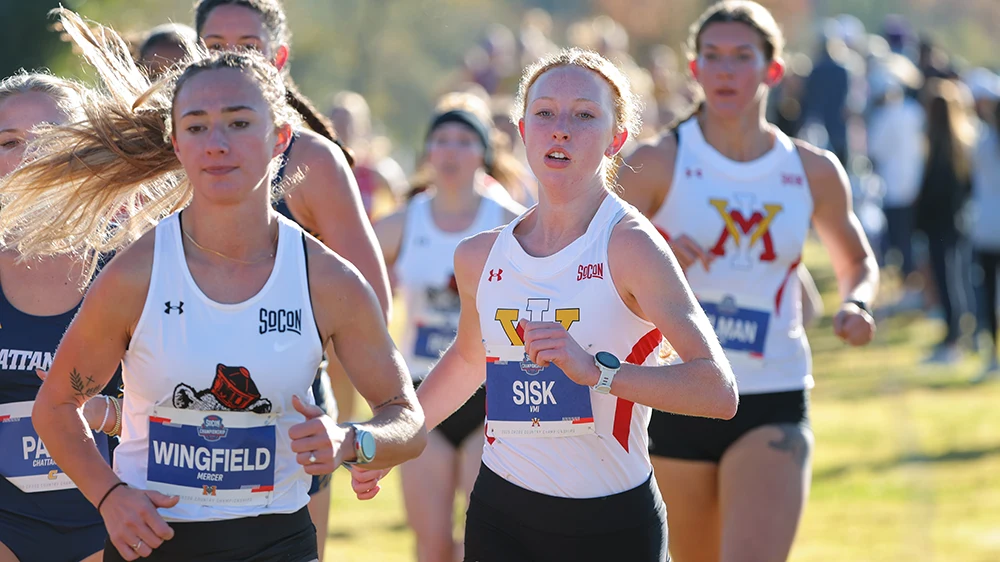Danny Rocco, VMI’s head football coach since December 2022, is in his 40th season of coaching. He started coaching at his alma mater, Wake Forest University, almost immediately after graduation and was the youngest assistant coach in the Atlantic Coast Conference at the time.
Asked why he and his brother, Frank, pursued coaching careers, Rocco responded, “It is in our DNA.” By this, he meant that they are following their father’s example. Described by Rocco as “a life-long educator,” he coached at the high school and college levels for almost 40 years, including 18 years as an assistant to the legendary Joe Paterno at Penn State. “We grew up in it. From a very young age, we attended his practices and camps. We started by shagging balls, and later we were setting up drills.”
Growing up on a sideline—and then playing football for his father—gave Rocco what he describes as “the amazing privilege of seeing how my dad influenced his players—many of whom were my teammates and friends. I was able to see the impact you have on your players as an educator and a coach.”
“I see myself first and foremost as an educator,” said Rocco. “But I am not just teaching football. I am teaching character and values like integrity, self-discipline, and the rewards of hard work. These are the things that will stay with my players for the rest of their lives.”
Coaching, he points out, has changed a lot since the mid-1980s. “There are many more things you need to think about in terms of motivation, management, and personnel—like the transfer portal—and more expectations to meet. For example, coaches can now watch a prospective recruit play via video technology. But you need to be comfortable with that technology and make sure your staff is, too.”
Despite the changes, for Rocco, the coaching’s essence is timeless. “At its core, coaching always has been about uniting a group of men in pursuit of a common goal. Getting them to work in symphony, building a consensus—first on small decisions than on large ones—and creating a team that is strong, united, and highly motivated is powerful and very satisfying.”
Asked what attracted him to VMI, Rocco replied, “When I worked in Virginia from 2001 to 2016, I came to know and respect VMI’s mission and its graduates’ service to Virginia and the country. Whenever my teams competed against VMI, I admired the players’ toughness, tenacity, and spirit.” The presence of Jim Miller as the Institute’s athletic director also made the job attractive. “I worked for Jim at Richmond for five seasons, and we always had a good relationship.”
Rocco sees two challenges particular to VMI football. “The first is roster management. To be successful, you need the right guys in the right positions, and you’re always looking to build depth. Other schools have ways to keep players for five years. Most teams, therefore, have at least seven or eight five-year men, some as many as 12 to 15.” Without the ability to offer a fifth year, Rocco explained, VMI will be a “‘young team’ with a relatively large number of freshmen and sophomores on the field.”
What Rocco calls “the time-management piece” is the second challenge. “Cadets have more demands on their time than students at regular colleges and universities, all of which serve a purpose within VMI’s education,” he explained. “The task for cadet-athletes is to ensure they have the gas in the tank for all of it.”
Rocco also sees benefits to how VMI shapes character. “In our society, there is a pull between ‘status’ and ‘substance.’ Many people are status-driven. They want to be something that gets them attention, like on social media. Substance-driven people and institutions want to be something better, to do something better, even if a lot of people don’t readily notice it. VMI is a substance-driven place. It attracts people who are substance driven, and they make good football players.”

“At its core, coaching always has been about uniting a group of men in pursuit of a common goal,” said Danny Rocco, VMI football head coach.—Photo courtesy Jakub Deptula, VMI coordinator of athletic multimedia.
One of a head coach’s responsibilities is building a staff. When Rocco does this, he has in mind “what was passed to me by Tom Coughlin and Al Groh, two great coaches who were successful in college and professional football, and what I’ve learned from my own experience.”
“First, they must be passionate about football. If you don’t love this game, why bother?” Rocco began. “Next, I’m 62 years old, but I know I must keep changing. So, I look for evidence of a constant pursuit of growth and improvement. As I said earlier, a coach is as much an educator as he is anything else. So, I look for men with an ability to teach.”
“Football is a team sport. So, an effective assistant must be committed to being a team player and to motivating others to be part of the team,” he continued. “Assistant coaches also have to emulate the head coach in terms of attitude and messaging to their colleagues and players.”
As Rocco sees it, another responsibility for a head coach is developing an understanding of what it takes to win. For him, that is not based on instinct but on serious, long-term study. After researching successful teams in college and professional football as well as the NBA, NHL, and Major League Baseball, he has drawn many lessons. One is that the teams with superior resources—payroll, funding, fan base, and facilities—don’t always win. “For example, the Yankees are the richest team in baseball, but they haven’t won a World Series since 2009.”
“Winning teams are poised and respond well in pressure-filled, demanding moments,” said Rocco. “So, coaches need to build mental toughness in their players and prepare them to deal with those moments. You develop in them an understanding of the situations so that their reactions to them are instinctive, akin to a ‘muscle memory.’’’
As to spring football, Rocco says. “In all aspects, the team made steady improvement. We focused on introducing systems and inculcating a new culture. We began to work on how we will handle certain game situations, such as a third down and long with two minutes on the clock.”
“Afterward,” he continued, “we had a thorough evaluation of our players. My assistants met with their players one-on-one, and then I met with them one-on-one as well. Let me put it this way; we had a different team and a better team in early May than we had in early January. There is great energy on the field and in the locker room, and the players are excited about football.”
And what can we expect in the fall? “As well as a teacher, I also have been a builder. As a head coach, I have built successful programs. That’s my goal here: To build a team that is disciplined, that finishes their duties, and takes care of the ball. I want a team in which everyone has a sense of ownership and believes he has the opportunity to solve any problem.”
“To build anything, you need a strong foundation, and ours is made up of character, hard work, transparency, and trust.” He paused and smiled, “Oh, yes, you also need to have at least a little fun.”






